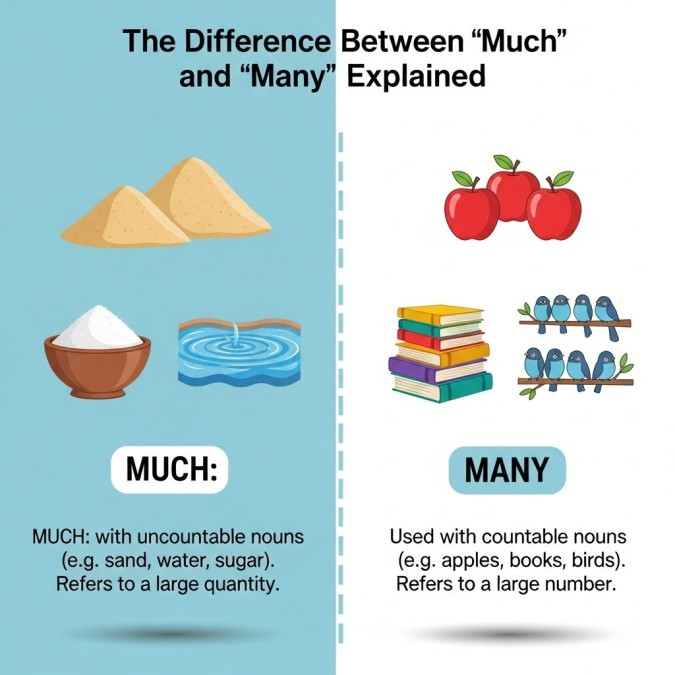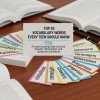🧠 The Difference Between “Much” and “Many” Explained
A Complete Smart Learning Guide for Teens Who Want to Sound Fluent and Confident
✨ Section 1: Why “Much” and “Many” Confuse Learners — and Why It Matters
If you’ve ever hesitated mid-sentence, wondering whether to say “I don’t have much homework” or “I don’t have many homework”, you’re not alone. For Thai learners (and many others), “much” and “many” are tricky because in Thai, we don’t have a direct grammatical split between countable and uncountable nouns in the same way English does.
Yet, mastering this difference is more than just passing a grammar test—it’s about clarity and credibility. Using the wrong word can make your English sound unnatural, even if the listener understands your meaning. And in exams, interviews, or presentations, that small slip can cost you points or confidence.
🔍 The Core Rule
- Much → used with uncountable nouns (things you can’t count individually)
- Many → used with countable nouns (things you can count one by one)
But that’s just the start. There are exceptions, idiomatic uses, and style choices that make the story richer.
📚 Understanding Countable vs. Uncountable Nouns
Countable nouns are things you can count:
- 1 apple, 2 apples, 3 apples
- 1 chair, 4 chairs
Uncountable nouns are things you can’t count individually:
- water, sugar, information, furniture
In English, this distinction affects:
- Which quantifiers you use (much/many, few/little, some/any)
- Whether you use plural forms
- Which verbs agree with the noun
🧠 Why Teens Often Mix Them Up
- Direct translation from Thai — In Thai, “น้ำตาลเยอะ” could be “much sugar” or “many sugar” if translated word-for-word.
- Plural confusion — Some nouns look plural but are uncountable (news, mathematics).
- Spoken shortcuts — In casual speech, native speakers sometimes bend the rules (“so much fun” vs. “so many fun times”).
🚀 Section 2: How to Use “Much” and “Many” Correctly — With Examples and Practice
Let’s break it down into practical rules, examples, and exercises.
Rule 1: Use “Much” with Uncountable Nouns
Uncountable nouns are treated as singular in English. They don’t take “a” or “an” and don’t have plural forms.
Examples:
- I don’t have much time. ✅
- There isn’t much sugar in the jar. ✅
- ❌ I don’t have many time. (wrong)
Common uncountable nouns:
- liquids: water, milk, juice
- substances: sugar, rice, gold
- abstract ideas: information, advice, knowledge
- mass nouns: furniture, equipment, luggage
Rule 2: Use “Many” with Countable Nouns
Countable nouns can be singular or plural.
Examples:
- I have many friends. ✅
- There aren’t many chairs in the room. ✅
- ❌ I have much friends. (wrong)
Common countable nouns:
- people: friends, teachers, students
- objects: books, cars, pens
- animals: cats, dogs, birds
Rule 3: Negative and Question Forms
In modern English, “much” is more common in negative and question forms, while “many” is used freely in all forms.
Examples:
- ❓ How much money do you have?
- ❓ How many apples are there?
- ❌ I have much money. (sounds unnatural in positive form; better: “I have a lot of money.”)
Rule 4: Positive Statements
In positive sentences, native speakers often prefer a lot of or lots of instead of “much” or “many”.
Examples:
- I have a lot of friends. ✅
- She has lots of patience. ✅
- I have many friends. (formal, correct, but less common in casual speech)
Rule 5: Fixed Expressions
Some phrases always use “much” or “many” regardless of countability rules.
Much:
- much obliged (formal thank you)
- much the same
- make much of something
Many:
- many thanks
- too many cooks spoil the broth
- as many as (quantity emphasis)
📊 Quick Reference Table
| Aspect | Meaning | Example |
|---|---|---|
| Much | Large quantity of uncountable noun | I don’t have much sugar. |
| Many | Large quantity of countable noun | I have many books. |
| A lot of | Large quantity (countable or uncountable) | I have a lot of friends / a lot of time. |
| Lots of | Informal large quantity | She has lots of energy. |
📝 Practice Challenge
Fill in the blanks with much or many:
- There aren’t ___ chairs in the room.
- How ___ rice do we need?
- I have ___ homework today.
- She doesn’t have ___ friends here.
- We saw ___ stars last night.
(Answers: many, much, much, many, many)
🌟 Section 3: Mastery Tips, Common Mistakes, and Real-Life Usage
🔹 Tip 1: Think in “Countable vs. Uncountable” First
Before choosing “much” or “many,” ask yourself: Can I count it? If yes → many. If no → much.
🔹 Tip 2: Watch Out for “Tricky” Nouns
Some nouns are uncountable in English but countable in Thai:
- Advice → uncountable (a piece of advice, not an advice)
- Information → uncountable (some information, not informations)
- Furniture → uncountable (a piece of furniture, not furnitures)
🔹 Tip 3: Formal vs. Informal Tone
- “Many” is fine in both formal and informal contexts.
- “Much” in positive statements sounds formal; use “a lot of” in casual speech.
🔹 Tip 4: Listening Practice
Watch English shows or YouTube videos and note when speakers use “much” or “many.” Pay attention to whether the noun is countable or uncountable.
🔹 Tip 5: Speaking Practice
Challenge yourself to describe your day using at least 5 sentences with “much” and 5 with “many.” Example:
- I didn’t drink much water today.
- I met many new classmates.
❌ Common Mistakes to Avoid
- ❌ I have much friends. → ✅ I have many friends.
- ❌ How many money do you have? → ✅ How much money do you have?
- ❌ There isn’t many sugar left. → ✅ There isn’t much sugar left.
🌍 Real-Life Application
- In school: Talking about homework, classmates, or time before exams.
- In travel: Asking about luggage weight, number of tickets, or amount of money.
- In hobbies: Describing collections (many books) or resources (much equipment).
📈 Smart Learning Integration
Inside Smart Learning, you can:
- Take interactive quizzes that adapt to your mistakes.
- Use voice practice to say sentences with “much” and “many” and get instant feedback.
- Play countable vs. uncountable games to make the rules automatic.
💬 Final Thoughts
“Much” and “many” are small words with a big impact. Once you master them, your English will sound more natural, precise, and confident. Remember:
- Much → uncountable
- Many → countable
- In positive sentences, “a lot of” is often more natural.
With consistent practice, you’ll never hesitate again.



